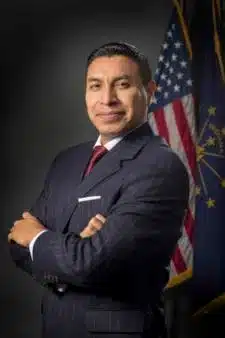
Diego Morales (above), Republican candidate for Indiana secretary of state, on Friday defended his claim to being a veteran after an Indianapolis newspaper columnist and Indiana Democrats questioned his military service.
Morales said in an interview with The Statehouse File that he considers himself a veteran.
He added that he’d leave the legal definitions to others, saying he knows he’s “in compliance to the law and … so proud to have served the greatest country on earth, the United States of America.”
“Morales’ military service might very well be exactly what he says it is. But he has a history of making questionable claims,” James Briggs wrote in an IndyStar column published Wednesday, citing earlier reports of Morales’ troubled employment history in the Office of the Secretary of State.
The Indiana Democratic Party later issued a press release with the headline, “Investigation finds Diego Morales inappropriately described himself as an American veteran,” stating, “He served our nation, but never achieved official status as ‘veteran.’”
In a subsequent press release, Indiana Republicans defended Morales.
“Their attacks on Diego’s service in the Indiana National Guard are extremely disappointing,” Kyle Hupfer, Indiana Republican Party chairman, said in a statement. “Diego—like thousands of Hoosiers—has honorably served our state and nation, and we at the Indiana Republican Party are thankful for this service and dedication.”
U.S. Code says, “The term ‘veteran’ means a person who served in the active military, naval, air, or space service, and who was discharged or released therefrom under conditions other than dishonorable.”
And a qualification for active duty is “full-time duty in the Armed Forces, other than active duty for training.”
Legislation passed by the Indiana General Assembly in 2016 defined a “Hoosier veteran” as someone who lives in the state and “served in a reserve component of the armed forces of the United States or the Indiana National Guard.” A Hoosier veteran must also have “completed any required military occupational specialty training and was not discharged or separated from the armed forces or the Indiana National Guard under dishonorable or other than honorable conditions.”
Documents the Morales campaign has released suggest that he falls under the definition of Hoosier veteran only, as his DD-214 which indicates he served in the Army National Guard for about five years between 2007 and 2013 and characterizes his separation as “release from active duty training.”
Teresa Mankin, who was formerly the executive director of the National Guard Association of Indiana, told The Statehouse File, “I believe that he could call himself a Hoosier veteran,” but he doesn’t meet the federal requirements.
“But the average person probably doesn’t care about that,” Mankin said. “If you served your country honorably, you are a veteran.”
Mankin did say, however, she would not describe herself as a U.S. Army veteran—as Morales does in his Twitter bio, for example—and would instead use “Army National Guard veteran.”